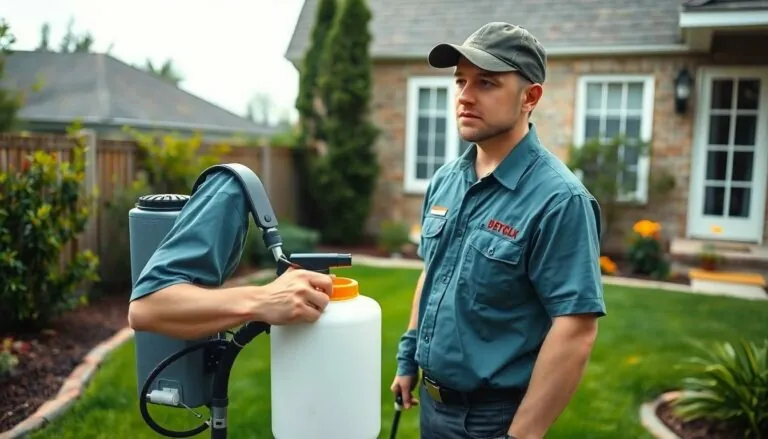Table of Contents
ToggleIn a world where pests seem to have their own agenda, biotech pest control emerges as the superhero we didn’t know we needed. Forget the days of chasing bugs with a rolled-up newspaper or pouring toxic chemicals around the garden. This innovative approach harnesses the power of biotechnology to tackle pesky invaders while keeping our environment safe and sound.
Overview Of Biotech Pest Control
Biotech pest control leverages biological processes to manage pest populations effectively. This method utilizes natural predators, parasites, and pathogens specific to targeted pests, reducing reliance on harmful chemicals. Techniques such as genetic modification and biopesticides represent cutting-edge innovations in this field.
Examples of biopesticides include those derived from microorganisms, plant extracts, and naturally occurring substances. These biopesticides target specific pest species while minimizing risks to humans, beneficial insects, and the environment. Effective biopesticides exhibit efficacy at low concentrations, reducing the volume of chemical input required for pest management.
Genetically modified organisms (GMOs) also play a role in biotech pest control. For instance, crops engineered with pest-resistant traits can withstand infestations from common agricultural pests, decreasing yield loss and lessening pesticide applications. These plants often express proteins that are toxic to specific pests but safe for humans and other non-target species.
Integrating biotech pest control into agricultural practices supports sustainable farming. By adopting these methods, farmers can protect their crops while fostering biodiversity and maintaining soil health. Additionally, this approach holds potential to enhance food security as populations grow and arable land diminishes.
Regulatory frameworks govern the use of these technologies, ensuring safety and efficacy. National and international bodies assess the risks of biotech pest control solutions before they enter the market. This oversight helps maintain consumer confidence in food safety while promoting the adoption of innovative pest management strategies.
Benefits Of Biotech Pest Control

Biotech pest control offers distinct advantages that benefit the environment and agriculture. This innovative approach promotes sustainable practices while addressing pest issues effectively.
Environmental Impact
Biotech pest control significantly reduces environmental harm. It lessens reliance on traditional chemical pesticides, which often lead to soil and water contamination. By utilizing natural predators and biopesticides, the method protects beneficial insects and maintains ecosystem balance. Additionally, biotechnology encourages biodiversity by minimizing the impact of pest management on non-target species. It actively supports resilient agricultural systems, fostering healthier ecosystems and enhancing overall agricultural sustainability.
Economic Advantages
Economic benefits of biotech pest control are substantial. Farmers experience reduced costs from lower pesticide usage while also increasing crop yields through effective pest management. Investments in biotechnology often lead to improved crop resilience, resulting in more consistent harvests. Moreover, these practices can enhance marketability, as consumers increasingly prefer products produced through environmentally responsible methods. Ultimately, biotech pest control aligns agricultural profitability with ecological stewardship, creating a win-win situation for farmers and the planet.
Methods Of Biotech Pest Control
Biotech pest control employs advanced techniques for managing pests sustainably and effectively. Two prominent methods include genetic engineering and biopesticides.
Genetic Engineering
Genetic engineering modifies crops to enhance their resistance to pests. Scientists select specific traits that reduce vulnerability, thus decreasing the need for chemical pesticides. Many crops now feature genes that produce natural insecticides, enabling them to defend against pest attacks. Innovations in this field lead to higher yields, as pests cause less damage. Regulatory assessments ensure the safety of these modified crops, fostering consumer trust. Many farmers shift towards these genetically engineered options, reflecting their effectiveness in modern agriculture.
Biopesticides
Biopesticides utilize natural organisms or their derivatives to target specific pests. Various types include microbial pesticides, derived from bacteria and fungi. Plant-based products derived from neem oil or pyrethrin provide additional options for pest management. Effectiveness varies, but these products generally present lower risks to humans and non-target organisms than traditional chemical pesticides. Farmers increasingly adopt biopesticides due to their environmental benefits, contributing to healthier ecosystems. Enhanced biodiversity and reduced chemical reliance reinforce sustainable farming practices.
Challenges And Considerations
Biotech pest control faces various challenges and considerations that can affect its adoption and effectiveness.
Regulatory Issues
Regulatory frameworks pose significant challenges for biotech pest control. Agencies like the Environmental Protection Agency assess the safety and efficacy of biopesticides and genetically modified crops. These evaluations often require extensive scientific data, which can delay product approval. Agricultural stakeholders must navigate complex regulations while ensuring compliance with safety standards. Regulations vary by region, making it crucial for farmers to stay informed about local laws. Adherence to these guidelines ultimately determines market access for biotech solutions. Ensuring consumer safety and environmental integrity remains a top priority for regulatory bodies.
Public Perception
Public perception influences the acceptance of biotech pest control methods. Misinformation about genetically modified organisms contributes to skepticism among consumers. Educational campaigns can help clarify the benefits and safety of these technologies. Transparency in the production and application of biopesticides can foster trust. Stakeholders must engage with communities to address concerns and answer questions. By promoting the ecological advantages of biotech pest control, support from the public may increase. Building confidence through dialogue encourages wider adoption of these innovative pest management solutions.
Future Of Biotech Pest Control
Emerging technologies in biotech pest control promise long-term solutions for sustainable agriculture. Genetic engineering continues to evolve, making crops resilient to pests. Advances in CRISPR technology enable precise genome editing, enhancing trait development and accelerating the breeding of pest-resistant varieties.
Biopesticides are gaining popularity, as natural solutions to pest problems. These products target specific pests with minimal impact on non-target organisms. Research shows that integrating biopesticides into pest management systems can improve crop health and yield outcomes.
Regulatory advancements may streamline approval processes for biotech innovations. Authorities are increasingly recognizing the importance of these methods in addressing pest challenges. By balancing safety and efficacy, regulatory bodies can facilitate quicker access to beneficial technologies.
Public perception remains critical in shaping the future of biotech pest control. Educational initiatives can improve understanding of these methods, alleviating consumer concerns regarding GMOs. Transparency in production practices fosters trust among consumers, paving the way for broader acceptance.
Collaboration between researchers, farmers, and policymakers is essential for success. Sharing knowledge and best practices helps overcome barriers and accelerate adoption. Continuous dialogue can drive innovation in biotech pest control, ultimately contributing to global food security.
Partnerships with the agricultural community can provide valuable feedback on the effectiveness of biotech solutions. This creates a responsive ecosystem that evolves with the needs of farmers and consumers. Anticipating challenges will ensure that biotech pest control remains a viable option for future generations.
Biotech pest control stands as a promising alternative to traditional pest management methods. By harnessing the power of biological processes and innovative technologies farmers can achieve sustainable agricultural practices that benefit both the environment and their bottom line. The integration of genetic engineering and biopesticides not only enhances crop resilience but also supports biodiversity and ecosystem health.
As the landscape of agriculture continues to evolve ongoing education and collaboration will be vital in addressing challenges and building public trust. With the right approach biotech pest control can play a crucial role in ensuring food security for future generations while promoting ecological stewardship.




